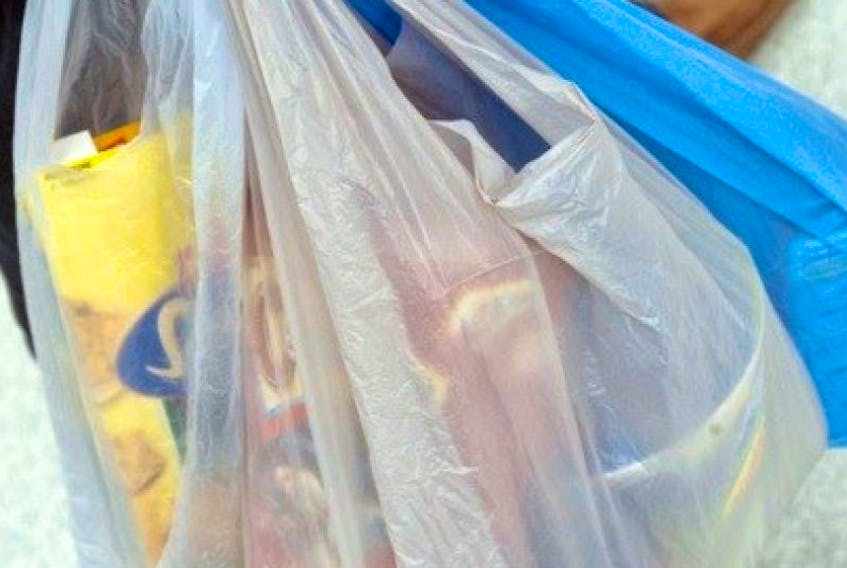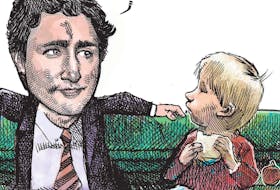Anyone younger than 40 won’t remember it, but there was a time when plastic shopping bags were an environmental saviour.
In the 1960s and ’70s, the fledgling environmental movement prompted people to think about the destruction of forests to produce all those paper shopping bags that were then in use. Pictures of bald hills and mountains that had been clear-cut made the argument against paper shopping bags clear-cut, so to speak.

Hence the term “tree hugger” entered popular usage, albeit with a derogatory intent.
Fast-forward 40 or 50 years, and environmentalists — and everyone else — are getting a lesson in the old adage “beware of unintended consequences.”
A recent item on the radio declared that by 2050, the weight of all the plastic in the oceans will equal the weight of all the sea life. Unfortunately, I didn’t catch the name of the person/institute that calculated this, or whether “sea life” includes seaweed, or just fish, mammals and other animals. Either way, it’s a horrifying notion.
In the 1960s and ’70s, the fledgling environmental movement prompted people to think about the destruction of forests to produce all those paper shopping bags that were then in use.
The tree huggers, through no fault of their own, didn’t foresee this. Neither did any of the millions of shoppers who agreed that paper shopping bags were environmentally destructive.
The plastic saviour has become a demon.
Today, reusable cloth bags are touted as an environmentally friendly solution for hauling home the great gobs of groceries every household buys weekly, or more often.
(A faint whisper can sometimes be heard from dieticians, imploring, “Eat less.”)
Cloth bags present their own dilemma. If they are cotton, they are plant-based and biodegradable, and presumably sustainable, i.e., they can be produced and eventually discarded without choking sea turtles.
But some cloth bags are made of polyester, which can be partly plastic and is made from oil byproducts. Oil. You know — greenhouse gases and all that.
Oh, and by the way, is there a factory somewhere in Ontario that manufactures all those 99-cent cloth bags that Canadians will soon be clamouring for? Of course not. They’re made in China or other Asian hotbeds of sweatshops and $1-per-day labour.
As a new adage goes, “No one said going green would be easy.”
Looking back from our vantage point in 2017, we can only wonder in hindsight why the detrimental consequences of using plastic shopping bags was not foreseen. Perhaps, in a theme that still applies today, everyone was too amazed and impressed by new processes and new products.
After all, 1967 gave us one of the most famous one-word lines in moviedom, in “The Graduate,” when a young Dustin Hoffman is given this advice by an older, wiser family friend: “Plastics.”
Fifty years from now, people might look back at the shopping habits of 2017 and declare with disgust, “People back then were utterly unconcerned about the brutal treatment of workers in Third World sweatshops.”
Of course, many people today are fully aware of this ongoing injustice. But they have thoroughly lost the argument to the globalizers. And so, cloth bags from Asia it will be.
If Premier Dwight Ball has his way, Newfoundorians will soon forgo clementines and avocados and other imported produce, and once again fill their shopping bags — whether cloth or plastic — with turnips and cabbage.
The provincial government’s effort to help spur local agriculture is laudable. The vast majority of our food is imported, which is expensive as well as environmentally destructive, due to all those gas-guzzling trucks and ships that bring bananas, beef, etc.
But Ball’s comment this week that the province had self-sustaining food production in the 1930s must have made many shoppers’ carts screech to a halt. Say what? Surely the premier isn’t suggesting we return to a diet of cabbage and cod. Modern tastes and nutritional requirements won’t allow it.
With heaps of irony, our climate will push us toward an inevitable conclusion: greenhouses.
“Hello, Mr. Sprung? We’re sorry we sullied your name, and we have a proposal for you….”
Brian Jones is a desk editor at The Telegram. He can be reached at [email protected].









